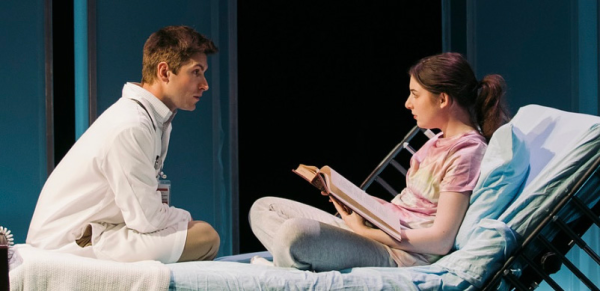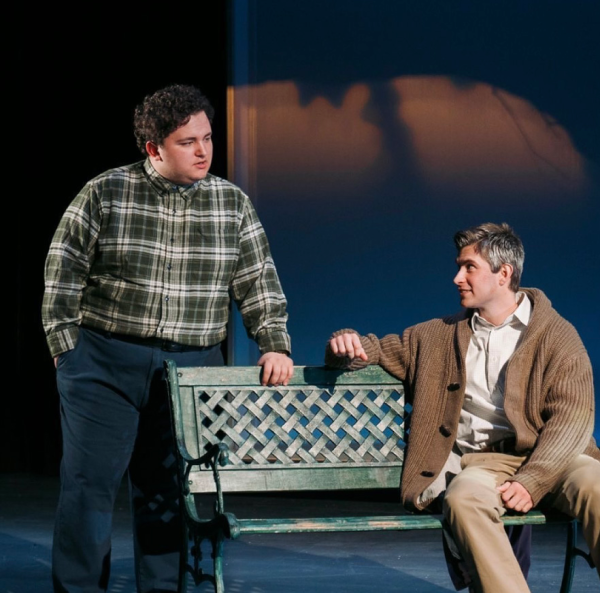
The reigning theme of Will Eno’s 2019 play The Underlying Chris—fluidly staged by Hamilton’s Theater Department as directed by Professor Craig Latrell—is rendered clear from the get-go. If not gleaned from a glance at the title, the message may be divined from the play’s prologue, a whimsical précis masquerading as a monologue, imparted with verve: “It’s a story about the moments that shape a life, and the people who shape a moment. And the things we don’t have names for. The essence, I guess. The spirit.” Get it? Don’t worry if not—it’ll be repeated.
The effectiveness of the play, which charts Chris’s life from infancy to sedate funeral, hinges on an unconventional stylistic device: a rotating cast of actors variously inhabit various characters, so that Chris is played by different actors across different scenes, separated by intervals ranging from a few years to a swiftly-passing decade.
Narratively, the play adopts a fairly traditional birth-to-death plotline, distilling generic plot points from an agglomerate of tragic archetypes. Chris is orphaned at an early age and later adopted by benevolent guardians; in midlife, he/she commits the typical transgression and has an affair, later much regretted. We watch him/her transform, via a series of dissociated scenes, into a doddery, disoriented grandparent, confined to a nursing home. Then: the closed casket, the yawning grave. Some morose funeral-goers mill around contemplating mortality.
Though the play hits its narrative beats with precision—each scene is deftly written and integrated into the larger chronology of the play—Eno’s controlled, measured portrait of a life entire is essentially ensured by his faithfulness to cliché. Each actor successfully reenacts enough of Chris’s enduring attributes to unify the whole of play, while variations in age and gender (both within the text and enacted on stage) communicate that this one life is not only composed of multiple iterations and bodily forms, forever metamorphosing, but also that Chris’s life could be any of our lives, and his most formative moments could turn out to resemble many of ours as well. It’s an unfortunate truth, however, that generality so often fails to be universal.
Chris’s experiences simulate the stuff of novels more so than any particular reality; Eno’s play may hold up a mirror, but it’s not clear whether we, the audience, are reflected or if it simply reduplicates and amplifies hackneyed narrative conventions. The play’s reliance on often sentimental bromides of dialogue and plot sometimes has the effect of minimizing the creativity of its premise.
Perhaps the most enticing aspect of the play is its diversity of actors—it was never clear who was going to appear next—and the expressiveness and pathos they conveyed. There was quite a bit of weeping by the close of the play. Here’s a characteristic speech, recited by a funeral attendee: “It’s quite an honor to be born, isn’t it. And it takes some strength to live up to that honor. So, strength. And of course love.”
There’s a certain measure of cheeky—but mostly unexercised—angularity in the play’s dialogue, replete with japes and witticisms; Eno might be a keen satirist if he weren’t so eager to smooth over tragedy with speechifying. But a bumpier play—less polished and perfected, maybe even a little rougher around the edges—might have enlivened and animated themes that currently are all too inert.

























